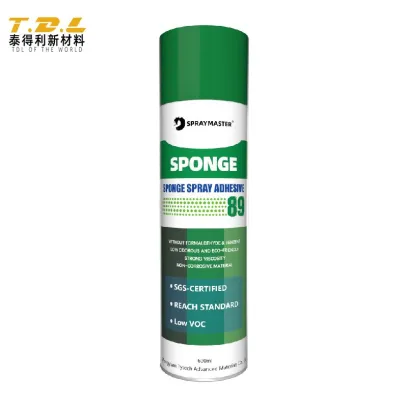What is the Sponge Spray Glue for Insulation Foam?
Sponge spray glue for insulation foam is a type of adhesive specifically designed for bonding foam materials commonly used in insulation applications. This adhesive is formulated to provide a strong and durable bond between foam substrates, ensuring effective insulation and preventing gaps or air leaks. Here are key features and considerations regarding sponge spray glue for insulation foam:
1. Formulation:
Sponge spray glue for insulation foam is typically formulated as a spray adhesive, allowing for easy and even application on large surfaces. The formulation is often designed to be compatible with various types of foam commonly used in insulation, such as polyurethane foam or expanded polystyrene (EPS).
2. Bonding Strength:
The adhesive is engineered to deliver a strong and lasting bond between foam surfaces. This is crucial for maintaining the integrity of insulation applications, preventing sagging, and ensuring optimal thermal performance.
3. Fast Tack and Drying:
Many sponge spray glues for insulation foam offer a fast tack, meaning that they quickly establish an initial bond upon contact. Additionally, they often have a relatively quick drying time, allowing for efficient installation and minimizing downtime.
4. Compatibility with Foam Types:
It's essential to choose an adhesive that is compatible with the specific type of foam being used for insulation. Different foams may have varying chemical compositions, and an adhesive formulated for one type may not work optimally with another.

5. Moisture Resistance:
Given the potential exposure to moisture in insulation applications, some sponge spray glues are formulated to be moisture-resistant. This feature helps maintain the adhesive's effectiveness and prevents degradation over time.
6. Ease of Application:
The spray format of these adhesives simplifies the application process. Users can evenly apply the adhesive over the foam surface, ensuring full coverage and a secure bond.
7. Heat Resistance:
Insulation materials can be exposed to a range of temperatures, so heat resistance is often a desirable characteristic in sponge spray glues for insulation foam. This ensures that the adhesive maintains its bond even under temperature variations.
8. Low VOC Formulations:
Many modern adhesives are formulated with low volatile organic compound (VOC) content, contributing to better indoor air quality and environmental friendliness.
9. Compatibility with Facing Materials:
Some insulation foams have facing materials like foil or paper, and it's important to choose an adhesive that is compatible with these facing materials if they are present in your insulation application.
10. Safety Considerations:
Always follow safety guidelines provided by the adhesive manufacturer. Adequate ventilation and personal protective equipment may be recommended during application.
When using sponge spray glue for insulation foam, carefully read and follow the manufacturer's instructions to ensure proper application and performance. It's also advisable to conduct a small test application on a sample piece of foam to verify compatibility and bonding strength before full-scale use in insulation projects.
300
0
0

Comments
All Comments (0)